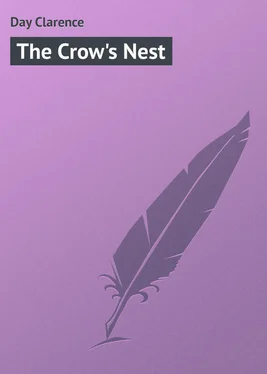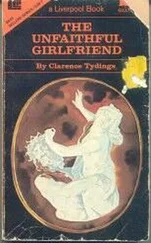Clarence Day - The Crow's Nest
Здесь есть возможность читать онлайн «Clarence Day - The Crow's Nest» — ознакомительный отрывок электронной книги совершенно бесплатно, а после прочтения отрывка купить полную версию. В некоторых случаях можно слушать аудио, скачать через торрент в формате fb2 и присутствует краткое содержание. Издательство: Иностранный паблик, Жанр: foreign_prose, на английском языке. Описание произведения, (предисловие) а так же отзывы посетителей доступны на портале библиотеки ЛибКат.
- Название:The Crow's Nest
- Автор:
- Издательство:Иностранный паблик
- Жанр:
- Год:неизвестен
- ISBN:нет данных
- Рейтинг книги:5 / 5. Голосов: 1
-
Избранное:Добавить в избранное
- Отзывы:
-
Ваша оценка:
- 100
- 1
- 2
- 3
- 4
- 5
The Crow's Nest: краткое содержание, описание и аннотация
Предлагаем к чтению аннотацию, описание, краткое содержание или предисловие (зависит от того, что написал сам автор книги «The Crow's Nest»). Если вы не нашли необходимую информацию о книге — напишите в комментариях, мы постараемся отыскать её.
The Crow's Nest — читать онлайн ознакомительный отрывок
Ниже представлен текст книги, разбитый по страницам. Система сохранения места последней прочитанной страницы, позволяет с удобством читать онлайн бесплатно книгу «The Crow's Nest», без необходимости каждый раз заново искать на чём Вы остановились. Поставьте закладку, и сможете в любой момент перейти на страницу, на которой закончили чтение.
Интервал:
Закладка:
Day Clarence
The Crow's Nest
The Crow's Nest
The Three Tigers
As to Tiger Number One, what he likes best is prowling and hunting. He snuffs at all the interesting and exciting smells there are on the breeze; that dark breeze that tells him the secrets the jungle has hid: every nerve in his body is alert, every hair in his whiskers; his eyes gleam; he's ready for anything. He and Life are at grips.
Number Two is a higher-browed tiger, in a nice cozy cave. He has spectacles; he sits in a rocking-chair reading a book. And the book describes all the exciting smells there are on the breeze, and tells him what happens in the jungle, where nerves are alert; where adventure, death, hunting and passion are found every night. He spends his life reading about them, in a nice cozy cave.
It's a curious practice. You'd think if he were interested in jungle life he'd go out and live it. There it is, waiting for him, and that's what he really is here for. But he makes a cave and shuts himself off from it – and then reads about it!
Once upon a time some victims of the book-habit got into heaven; and what do you think, they behaved there exactly as here. That was to be expected, however: habits get so ingrained. They never took the trouble to explore their new celestial surroundings; they sat in the harp store-room all eternity, and read about heaven.
They said they could really learn more about heaven, that way.
And in fact, so they could. They could get more information, and faster. But information's pretty thin stuff, unless mixed with experience.
But that's not the worst. It is Tiger Number Three who's the worst. He not only reads all the time, but he wants what he reads sweetened up. He objects to any sad or uncomfortable account of outdoors; he says it's sad enough in his cave; he wants something uplifting So authors obediently prepare uplifting accounts of the jungle, or they try to make the jungle look pretty, or funny, or something; and Number Three reads every such tale with great satisfaction. And since he's indoors all the time and never sees the real jungle, he soon gets to think that these nice books he reads may be true; and if new books describe the jungle the way it is, he says they're unhealthy. "There are aspects of life in the jungle," he says, getting hot, "that no decent tiger should ever be aware of, or notice."
Tiger Number Two speaks with contempt of these feelings of Three's. Tigers should have more courage. They should bravely read about the real jungle.
The realist and the romantic tiger are agreed upon one point, however. They both look down on tigers that don't read but merely go out and live.
As They Go Riding By
What kind of men do we think the mediæval knights really were? I have always seen them in a romantic light, finer than human. Tennyson gave me that apple, and I confess I did eat, and I have lived on the wrong diet ever since. Malory was almost as misleading. My net impression was that there were a few wicked, villainous knights, who committed crimes such as not trusting other knights or saying mean things, but that even they were subject to shame when found out and rebuked, and that all the rest were a fine, earnest Y. M. C. A. crowd, with the noblest ideals.
But only the poets hold this view of knights, not the scholars. Here, for example, is a cold-hearted scholar, Monsieur Albert Guerard. He has been digging into the old mediæval records with an unromantic eye, hang him; and he has emerged with his hands full of facts which prove the knights were quite different. They did have some good qualities. When invaders came around the knights fought them off as nobly as possible; and they often went away and fought Saracens or ogres or such, and when thus engaged they gave little trouble to the good folk at home. But in between wars, not being educated, they couldn't sit still and be quiet. It was dull in the house. They liked action. So they rode around the streets in a pugnacious, wild-western manner, despising anyone who could read and often knocking him down; and making free with the personal property of merchants and peasants, who they thought had no special right to property or even to life. Knights who felt rough behaved as such, and the injuries they inflicted were often fatal.
They must have been terrors. Think of being a merchant or cleric without any armor, and meeting a gang of ironclads, with the nearest police court centuries off! Why, they might do anything, and whatever they did to a merchant, they thought was a joke. Whenever they weren't beating you up they fought with one another like demons – I don't mean just in tournaments, which were for practice, but in small, private wars. And to every war, public or private, citizens had to contribute; and instead of being thanked for it, they were treated with the utmost contempt.
Suppose a handsome young citizen, seeing this and feeling ambitious, tried to join the gang and become a knight himself. Would they let him? No! At first, if he were a powerful fighter, he did have a small chance, but as time went on and the knights got to feeling more noble than ever, being not only knights but the sons of knights, they wouldn't let in a new man. The mere idea made them so indignant they wanted to lynch him. "Their loathing for the people seemed almost akin in its intensity to color prejudice."
They were also extravagant and improvident and never made money, so the more they spent the more they had to demand from the people. When every one had been squeezed dry for miles around, and had been thumped to make sure, the knights cursed horribly and borrowed from the Church, whether the Church would or no, or got hold of some money-lender and pulled his beard and never paid interest.
The Church tried to make them religious and partly succeeded; there were some Christian knights who were soldierly and courtly, of course. But, allowing for this (and for my exaggerating their bad side, for the moment), they certainly were not the kind of men Tennyson led me to think.
I do not blame Tennyson. He had a perfect right to romanticize. He may have known what toughs the knights were as well as anybody, but loved their noble side, too, and dreamed about it until he had made it for the moment seem real to him, and then hurried up and written his idyls before the dream cracked. He may never have intended me or any of us to swallow it whole. "It's not a dashed bible; it's a book of verse," I can imagine him saying, "so don't be an idiot; don't forget to read your encyclopedia, too."
But verse is mightier than any encyclopedia. At least it prevails. That's because the human race is emotional and goes by its feelings. Why haven't encyclopedists considered this? They are the men I should blame. What is the use of embodying the truth about everything in a precise condensed style which, even if we read it, we can't remember, since it does not stir our feelings? The encyclopedists should write their books over again, in passionate verse. What we need in an encyclopedia is lyrical fervor, not mere completeness – Idyls of Economic Jurisprudence, Songs of the Nitrates. Our present compendiums are meant for scholars rather than people.
Well, the knights are gone and only their armor and weapons remain; and our rich merchants who no longer are under-dogs, collect these as curios. They present them with a magnificent gesture to local museums. The metal suit which old Sir Percy Mortimer wore, when riding down merchants, is now in the Briggsville Academy, which never heard of Sir Percy, and his armor is a memorial to Samuel Briggs of the Briggs Tailoring Company. In Europe a few ancient families, in financial decay, are guarding their ancestors' clothing as well as they can, but sooner or later they will be driven to sell it, to live. And they won't live much longer at that. The race will soon be extinct.
Читать дальшеИнтервал:
Закладка:
Похожие книги на «The Crow's Nest»
Представляем Вашему вниманию похожие книги на «The Crow's Nest» списком для выбора. Мы отобрали схожую по названию и смыслу литературу в надежде предоставить читателям больше вариантов отыскать новые, интересные, ещё непрочитанные произведения.
Обсуждение, отзывы о книге «The Crow's Nest» и просто собственные мнения читателей. Оставьте ваши комментарии, напишите, что Вы думаете о произведении, его смысле или главных героях. Укажите что конкретно понравилось, а что нет, и почему Вы так считаете.












